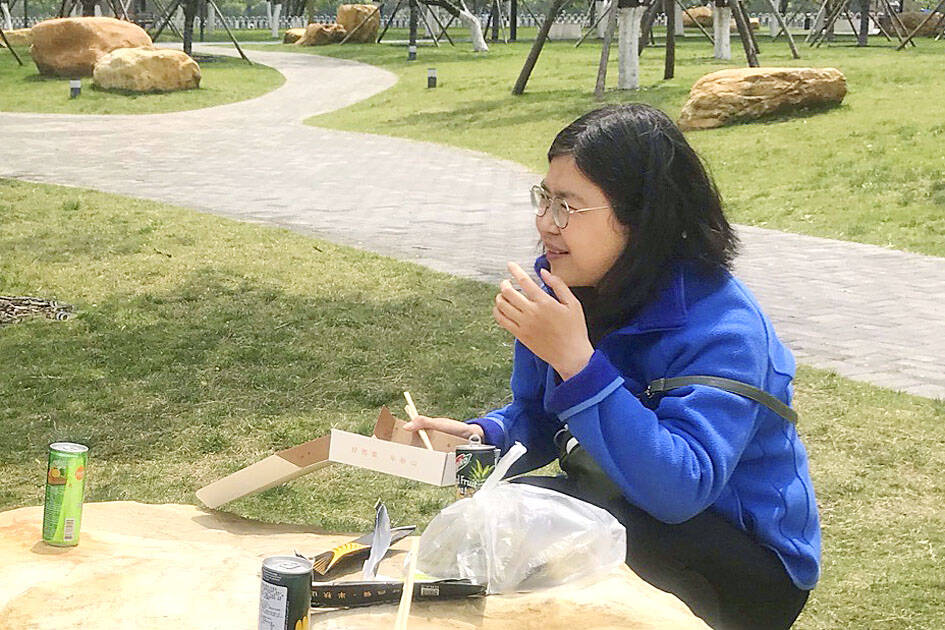A Chinese journalist jailed for four years after documenting the early phases of the COVID-19 outbreak from the pandemic’s epicenter was sentenced on Friday to four more years in prison, Reporters Without Borders (RSF) said on Saturday.
Zhang Zhan (張展), 42, was sentenced on a charge of “picking quarrels and provoking trouble” in China, the same charge that led to her December 2020 imprisonment after she posted first-hand accounts from the central city of Wuhan on the early spread of COVID-19, RSF said.
Chinese Ministry of Foreign Affairs could not be immediately reached yesterday for comment.

Photo: Melanie Wang via AP
“She should be celebrated globally as an ‘information hero,’ not trapped in brutal prison conditions,” RSF Asia-Pacific Bureau advocacy manager Aleksandra Bielakowska said in a statement. “Her ordeal and persecution must end. It is more urgent than ever for the international diplomatic community to pressure Beijing for her immediate release.”
Zhang was initially arrested after months of posting accounts, including videos, from crowded hospitals and empty streets that painted a more dire early picture of the disease than the official narrative. Her lawyer at the time, Ren Quanniu (任全牛), said Zhang believed she was “being persecuted for exercising her freedom of speech.”
She went on hunger strike the month after that arrest, according to court documents seen by Reuters, prompting police to strap her hands and force-feed her with a tube, her lawyers said at the time.
Zhang was released in May last year and detained again three months later, eventually being formally arrested and placed in Shanghai’s Pudong Detention Center, RSF said.
Friday’s sentencing followed Zhang’s reporting on China’s human rights abuses, RSF said.
Ren posted on X that the new charges were based on Zhang’s comment on overseas Web, sites and she should not be deemed guilty.
China’s authorities have never publicly specified what activities Zhang was charged for.

REVENGE: Trump said he had the support of the Syrian government for the strikes, which took place in response to an Islamic State attack on US soldiers last week The US launched large-scale airstrikes on more than 70 targets across Syria, the Pentagon said on Friday, fulfilling US President Donald Trump’s vow to strike back after the killing of two US soldiers. “This is not the beginning of a war — it is a declaration of vengeance,” US Secretary of Defense Pete Hegseth wrote on social media. “Today, we hunted and we killed our enemies. Lots of them. And we will continue.” The US Central Command said that fighter jets, attack helicopters and artillery targeted ISIS infrastructure and weapon sites. “All terrorists who are evil enough to attack Americans are hereby warned

‘POLITICAL LOYALTY’: The move breaks with decades of precedent among US administrations, which have tended to leave career ambassadors in their posts US President Donald Trump’s administration has ordered dozens of US ambassadors to step down, people familiar with the matter said, a precedent-breaking recall that would leave embassies abroad without US Senate-confirmed leadership. The envoys, career diplomats who were almost all named to their jobs under former US president Joe Biden, were told over the phone in the past few days they needed to depart in the next few weeks, the people said. They would not be fired, but finding new roles would be a challenge given that many are far along in their careers and opportunities for senior diplomats can

Seven wild Asiatic elephants were killed and a calf was injured when a high-speed passenger train collided with a herd crossing the tracks in India’s northeastern state of Assam early yesterday, local authorities said. The train driver spotted the herd of about 100 elephants and used the emergency brakes, but the train still hit some of the animals, Indian Railways spokesman Kapinjal Kishore Sharma told reporters. Five train coaches and the engine derailed following the impact, but there were no human casualties, Sharma said. Veterinarians carried out autopsies on the dead elephants, which were to be buried later in the day. The accident site

RUSHED: The US pushed for the October deal to be ready for a ceremony with Trump, but sometimes it takes time to create an agreement that can hold, a Thai official said Defense officials from Thailand and Cambodia are to meet tomorrow to discuss the possibility of resuming a ceasefire between the two countries, Thailand’s top diplomat said yesterday, as border fighting entered a third week. A ceasefire agreement in October was rushed to ensure it could be witnessed by US President Donald Trump and lacked sufficient details to ensure the deal to end the armed conflict would hold, Thai Minister of Foreign Affairs Sihasak Phuangketkeow said after an ASEAN foreign ministers’ meeting in Kuala Lumpur. The two countries agreed to hold talks using their General Border Committee, an established bilateral mechanism, with Thailand